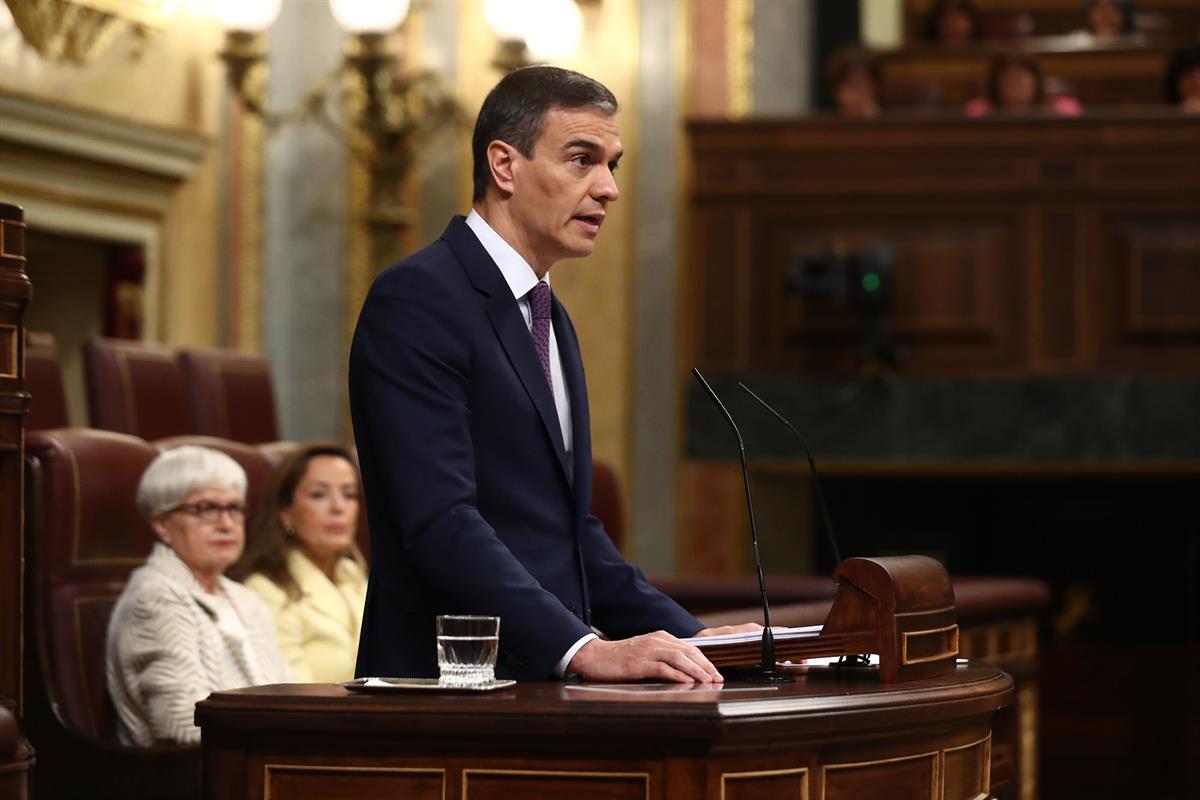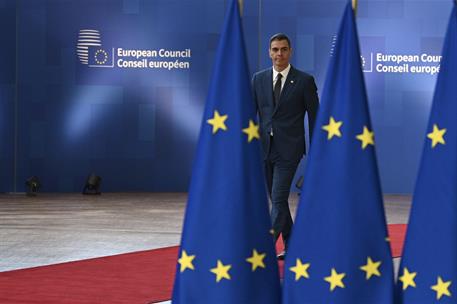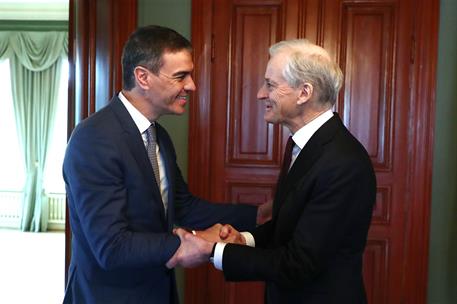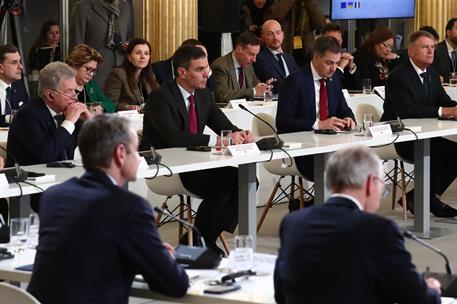Plenary session of the Lower House of Parliament
Pedro Sánchez: "For justice, coherence and peace, Spain will recognise the existence of a Palestinian state"
President's News - 2024.5.22
Lower House of Parliament, Madrid
 Pool Moncloa/Fernando Calvo
Pool Moncloa/Fernando Calvo
The President of the Government, Pedro Sánchez, appeared in the Lower House of Parliament to report on the new measures to be adopted by the Executive in foreign policy, headed by the recognition of a Palestinian state, which will be approved in the Council of Ministers on 28 May.
Spain thus joins the more than 140 countries that already recognise the Palestinian state, and the majority that recently voted in favour of Palestine's entry into the UN as a full member state. The head of the Spanish government also announced that other European countries will join Spain in this decision next week.
"If Spain voted in favour of recognising the Palestinian state as a full member of the United Nations, we must recognise the Palestinian state bilaterally," explained Pedro Sánchez, who confirmed that he had shared the reasons for this decision with the head of state, the president of the European Commission, the president of the European Council and the secretary general of the United Nations.
"In time, when the bombing stops, we will realise that we have witnessed one of the darkest episodes of this century. And when that happens, I want Spaniards to be able to say, with their heads held high and their consciences clear, that they were on the right side of history," said Pedro Sánchez.
Peace, justice and coherence
During his appearance, the president of the Government detailed the reasons why the coalition government has agreed to this recognition, which, he stressed, is not adopted "against Israel, against the Jews or in favour of Hamas". "We will recognise the State of Palestine for many reasons, which can be summed up in three words: peace, justice and coherence," he stressed.
In this context, Pedro Sánchez referred to the existence of two states - Israeli and Palestinian - as the only solution to the conflict in Gaza and pointed out that, in order to reach this solution, it is necessary for both parties to negotiate with equal legitimacy.
Pedro Sánchez also spoke of the historical debt with the Palestinian people and the commitment to human rights, which "cannot depend on the colour of the skin or the religion" of the victims. "We defend the same position in Ukraine as we do in Palestine, and that is the UN Charter and international law," he argued.
"We are going to recognise Palestine because it is the right thing to do and because we are confident that doing so will help to build a safer and more stable Mediterranean," concluded Pedro Sánchez, who announced that Spain will in the coming weeks take in around thirty Gazan children who have been diagnosed with cancer or who are suffering severe trauma in order to offer them safe treatment in Spain.
Agreement to extend cooperation with Ukraine
The Prime Minister called for a foreign policy that is "coherent and respectful of international law" both in Palestine and in Ukraine, where he recalled the serious situation caused by the Russian offensive against the northern region, which threatens the city of Kharkov, the second largest in the country, and which has forced the evacuation of more than 18,000 people.
The head of the Executive stressed Spain's unconditional support in the fight against Putin's imperialism and highlighted the talks he has held with more than 20 leaders of Latin American and African countries to urge them to take part in the Summit for Peace in Ukraine, to be held in Switzerland in a month's time.
He also announced that, as a result of bilateral negotiations with the Ukrainian government and when the situation on the frontline allows, an agreement will be signed with Ukraine that will raise economic, social and institutional cooperation between the two countries to a higher level.
Geopolitical, economic and social challenges
On the "delicate" geopolitical situation, the head of the Executive referred to other issues and measures recently adopted by the Spanish government in other areas. In this regard, he pointed out that at the last European Council, held on 17 and 18 April, Spain defended the implementation of a positive agenda with Turkey, a country with which a bilateral summit will soon be held.
Similarly, Spain supported increased EU support for Lebanon in the form of a 1 billion euro financial package. He recalled the "important" agreements on Gibraltar reached with the United Kingdom and the European Commission. "We are very close to achieving a historic milestone that will bring more legal certainty, more economic opportunities and more day-to-day facilities to the people of Campo de Gibraltar".
Pedro Sánchez also highlighted other geopolitical challenges facing Europe and Spain in a "difficult" international situation, such as the risk of collapse in the Sahel; economic challenges, such as the use of technology and competition from other international players; environmental challenges, such as mitigating and adapting to climate change; and social challenges, such as access to housing, improving the welfare state, protecting social rights and combating social, territorial, generational and gender inequality.
The government, he said, "is working on these challenges and is achieving positive and tangible results in all of them", and cited the employment figures, with more than 21 million people in work and productivity growth and the consolidation of public accounts.
Non official translation







